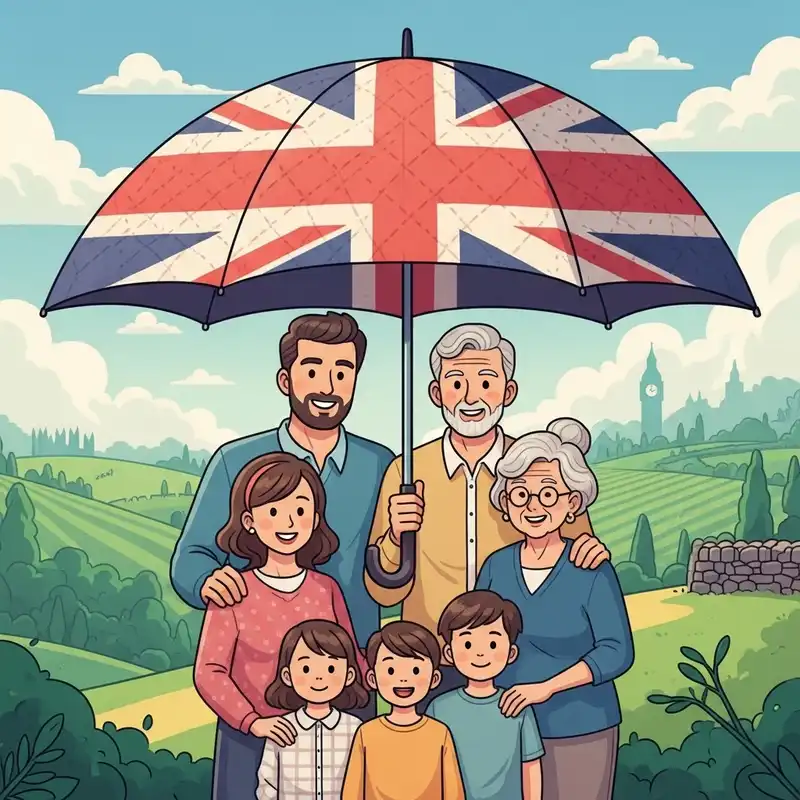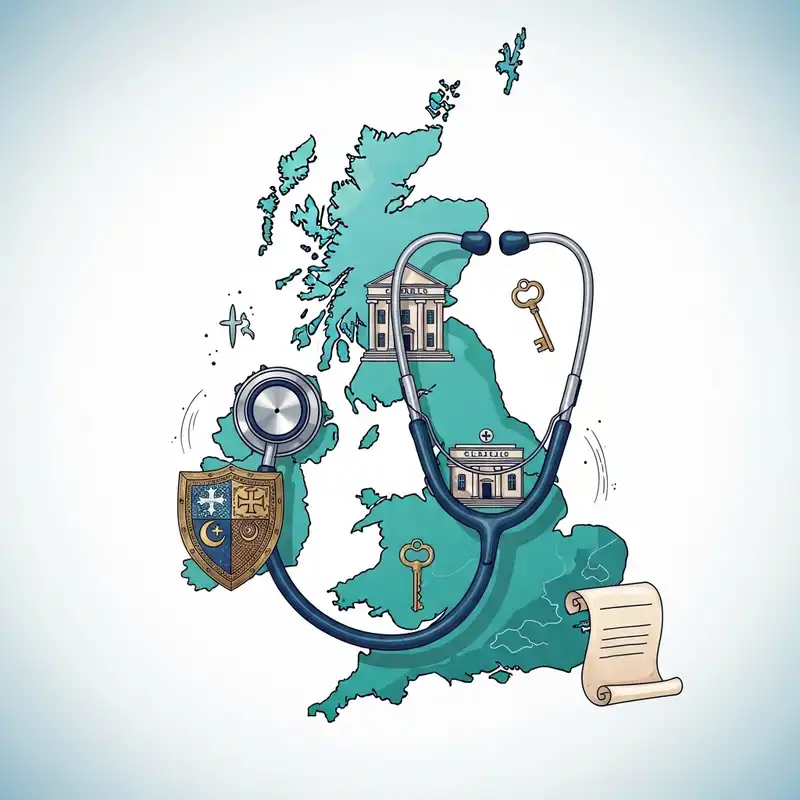TL;DR
In an age where we champion resilience, determination, and 'grit' as the cornerstones of success, it’s easy to overlook the silent foundations that make true personal growth possible. We plan our careers, our holidays, and our fitness regimes with meticulous detail, yet often leave the most significant variable—our health and financial stability—to chance.
Key takeaways
- Shorter-Term Focus: These policies are often designed to cover you for 12 or 24 months, bridging a more immediate gap rather than providing cover until retirement.
- Day-One Cover: Many plans offer the option of a very short deferred period, sometimes even from day one or day eight of being off work, which is vital when you have no employer sick pay.
- Simpler Underwriting: The application process can sometimes be simpler, with less focus on long-term medical history and more on your occupation.
- Clearing a mortgage or other debts, removing a huge financial burden.
- Paying for private medical treatment or specialist therapies not available on the NHS.
In an age where we champion resilience, determination, and 'grit' as the cornerstones of success, it’s easy to overlook the silent foundations that make true personal growth possible. We plan our careers, our holidays, and our fitness regimes with meticulous detail, yet often leave the most significant variable—our health and financial stability—to chance.
Beyond Grit the Hidden Pillars of True Personal Growth
The reality of modern life is that 'grit' alone cannot stand against a serious illness or accident. The journey of personal growth—whether it's starting a business, raising a family, mastering a new skill, or pursuing a passion—requires a stable platform from which to leap. This article explores how building a robust financial shield is not an act of pessimism, but one of profound optimism and empowerment. It's about giving yourself the freedom to live boldly, knowing you have a plan for the unpredictable.
The Modern Dilemma: When 'Hustle Culture' Meets Health Reality
We live in a culture that glorifies relentless effort. The narrative is compelling: work harder, push further, and you will succeed. But this philosophy has a critical blind spot. It assumes a constant state of good health and uninterrupted earning potential, an assumption starkly at odds with the facts.
According to Cancer Research UK, 1 in 2 people in the UK born after 1960 will be diagnosed with some form of cancer during their lifetime. This isn't a remote possibility; it's a statistical probability affecting half the population. Beyond cancer, the landscape of health is shifting. The Office for National Statistics (ONS) reported that in 2023, a record 2.8 million people were out of work due to long-term sickness, a significant increase in recent years.
When a health crisis strikes, it doesn't just impact your physical wellbeing. It triggers a cascade of consequences:
- Financial Shock: Your income may stop or reduce, but your bills do not. Mortgages, rent, utilities, and food costs continue, now compounded by potential travel expenses for treatment or home modifications.
- Career Derailment: A long absence can stall career progression, erode skills, or even force a career change. For the self-employed, it can mean the collapse of a business built over years.
- Relationship Strain: Financial stress is a leading cause of tension in relationships. The burden of care can shift dynamics, and the emotional toll can be immense for the entire family.
- Loss of Freedom: Suddenly, life's choices are dictated by illness and financial constraints, not by your aspirations. The freedom to travel, to invest in your children's future, or to simply live without constant money worries evaporates.
Grit is essential for navigating the emotional and physical challenges of recovery. But grit doesn't pay the mortgage. It doesn't fund private medical treatment to bypass NHS waiting lists. It doesn't replace a lost income. True, sustainable personal growth requires a foundation that is resilient to life's inevitable shocks.
Reframing Protection: From an Expense to an Investment in Your Future Self
For many, insurance feels like a grudge purchase—a monthly cost for a benefit you hope never to use. It's time to radically reframe this thinking. Financial protection is not an expense; it is one of the most powerful investments you can make in your own potential.
Think of it like this: a mountaineer doesn't view their safety ropes and harness as a burden. They are the very tools that give them the confidence to attempt the climb. Without them, the ascent would be reckless, if not impossible.
Strategic financial protection works in the same way. It is the proactive shield that provides:
- Peace of Mind: The psychological freedom that comes from knowing your family and lifestyle are protected is immeasurable. It reduces background anxiety and frees up mental energy to focus on what truly matters: your health, your family, and your goals.
- Control and Choice: When illness strikes, a protection plan gives you back a degree of control. You have the choice to seek private treatment, the choice to take the time you need to recover fully without financial pressure, and the choice to maintain your family's standard of living.
- The Foundation for Risk-Taking: Want to leave your stable job to start a business? Or take a sabbatical to retrain? Knowing you have a personal financial safety net, like Income Protection, makes these ambitious life decisions more viable. It de-risks your dreams.
Investing in protection is an act of responsibility to your future self and your loved ones. It’s a declaration that your life's work, your relationships, and your aspirations are too important to be left vulnerable to a turn of bad luck.
Your Financial Shield: A Deep Dive into Key Protection Products
Building your shield isn't about buying one single product. It's about layering different types of cover to create a comprehensive defence tailored to your unique circumstances. Here’s a breakdown of the essential components.
1. Income Protection (IP): The Cornerstone of Your Financial Security
If you could only choose one policy, a strong case could be made for Income Protection. It is designed to do one thing: replace a portion of your monthly income if you are unable to work due to any illness or injury.
Who is it for? Frankly, anyone who relies on their income to live. It is especially critical for:
- The self-employed and freelancers with no access to employer sick pay.
- Company directors whose income is derived from salary and dividends.
- Employees whose sick pay provision is limited (e.g., only a few weeks or months at full pay).
How it works: You choose a monthly benefit amount (typically 50-70% of your gross income), which is paid tax-free. You also select a 'deferred period' – the time you wait between being unable to work and the payments starting. This can range from 4 weeks to 12 months. A longer deferred period means a lower premium, so you can align it with your employer's sick pay scheme or your personal savings.
| Feature | Description | Key Consideration |
|---|---|---|
| Benefit Amount | The tax-free monthly sum you receive. | Should cover essential outgoings: mortgage, bills, food. |
| Deferred Period | The waiting period before payments begin. | Align with your sick pay and emergency savings. |
| Payment Term | How long the policy pays out for. | Can be short-term (1-5 years) or until retirement age. |
| Definition of Incapacity | The criteria used to assess your claim. | 'Own Occupation' is the most comprehensive definition. |
The 'definition of incapacity' is crucial. 'Own Occupation' cover means the policy will pay out if you are unable to do your specific job. Other, less robust definitions might only pay if you are unable to do any job, which offers far less protection. At WeCovr, we help our clients navigate these complexities to ensure they get the cover that truly protects their livelihood.
2. Personal Sick Pay: Specialised Cover for Hands-On Professions
While standard Income Protection is excellent, some professions carry unique risks that benefit from more specialised cover. Tradespeople (electricians, plumbers, builders), nurses, and other manual or high-risk workers often need a policy that responds more quickly and is tailored to the realities of their job.
This is where Personal Sick Pay (sometimes called Accident, Sickness & Unemployment cover) comes in.
Key Differences from Traditional Income Protection:
- Shorter-Term Focus: These policies are often designed to cover you for 12 or 24 months, bridging a more immediate gap rather than providing cover until retirement.
- Day-One Cover: Many plans offer the option of a very short deferred period, sometimes even from day one or day eight of being off work, which is vital when you have no employer sick pay.
- Simpler Underwriting: The application process can sometimes be simpler, with less focus on long-term medical history and more on your occupation.
Let's compare the two:
| Feature | Income Protection | Personal Sick Pay |
|---|---|---|
| Typical Term | Long-term (often to retirement age) | Short-term (typically 1, 2, or 5 years) |
| Deferred Period | 4 weeks to 52 weeks | 1 day to 13 weeks |
| Underwriting | Full medical and financial underwriting | Often simpler, occupation-focused |
| Best For | Protecting against long-term career-ending illness | Covering short to medium-term sickness for manual/riskier jobs |
For a self-employed electrician, a broken arm could mean an immediate halt to all income. A Personal Sick Pay policy with a one-week deferred period provides an immediate financial lifeline, whereas a standard IP policy with a three-month deferral would leave them exposed.
3. Life and Critical Illness Cover (CIC): A Lump Sum When It's Needed Most
A critical illness diagnosis is a life-altering event. While Income Protection replaces your salary, Critical Illness Cover is designed to provide a tax-free lump sum on the diagnosis of a specified condition.
This lump sum provides financial breathing space and options. It can be used for anything:
- Clearing a mortgage or other debts, removing a huge financial burden.
- Paying for private medical treatment or specialist therapies not available on the NHS.
- Adapting your home (e.g., installing a ramp or stairlift).
- Replacing lost income for a partner who takes time off to care for you.
- Funding a recuperative holiday to aid recovery and reconnect with family.
Most policies cover dozens of conditions, but the core focus remains on the "big three" which account for the majority of claims: cancer, heart attack, and stroke. According to the Association of British Insurers (ABI), UK insurers paid out over £14.7 billion in protection claims in 2023, with the vast majority being for life, critical illness, and income protection, demonstrating their vital role.
Often, Critical Illness Cover is combined with Life Insurance. This means the policy pays out either on diagnosis of a serious illness or on death, whichever comes first. This provides a comprehensive safety net for you and your family.
4. Family Income Benefit (FIB): A Smarter Way to Protect Your Family
Traditional life insurance pays out a large lump sum. While this is suitable for clearing a mortgage, it can be daunting for a grieving family to manage. How do you invest it? How much can you safely draw down each month?
Family Income Benefit offers an intelligent alternative. Instead of a single lump sum, it pays out a regular, tax-free monthly or annual income from the point of claim until the end of the policy term.
Example: Sarah and Tom, both 35, have two young children (aged 4 and 6). They take out a 20-year Family Income Benefit policy for £2,500 per month. If Tom were to pass away 5 years into the policy, Sarah would receive £2,500 every month for the remaining 15 years, until the original policy term ends. (illustrative estimate)
This mirrors a lost salary, making budgeting simple and providing stability during a difficult time. It's often more affordable than a comparable lump-sum policy, making it an excellent choice for young families wanting to protect their children's upbringing and lifestyle.
5. Private Medical Insurance (PMI): Taking Control of Your Health Journey
In the context of personal growth, time is your most valuable asset. Lengthy waits for diagnosis or treatment can put your life on hold for months, or even years. NHS waiting lists in the UK remain a significant challenge, with millions of people waiting for routine treatment.
Private Medical Insurance (PMI) is not a replacement for the NHS, but a complementary tool that gives you more control. Its key benefits include:
- Speed of Access: Bypassing long waiting lists for consultations, diagnostics (like MRI scans), and surgery.
- Choice: The ability to choose your specialist and hospital.
- Comfort and Privacy: Access to private rooms and more flexible visiting hours.
- Access to Specialist Drugs: Some policies provide cover for new or expensive drugs and treatments that may not be available on the NHS due to funding decisions.
For someone focused on personal or business growth, faster recovery means a faster return to their goals. The value of getting back to your business, your family, or your passions weeks or months earlier is immense.
6. Gift Inter Vivos: Securing Your Legacy
True personal growth often involves thinking beyond ourselves and planning for the next generation. Many people wish to pass on assets to their loved ones during their lifetime, a process known as making a 'gift inter vivos' (a gift between the living).
However, these gifts can be subject to Inheritance Tax (IHT) if the person making the gift (the donor) passes away within 7 years. The amount of tax due reduces on a sliding scale after 3 years (this is known as 'taper relief').
A Gift Inter Vivos insurance policy is a specialised form of life insurance designed to cover this potential tax liability. It is a 'decreasing term' policy, where the sum assured reduces over the 7-year period, mirroring the decreasing IHT liability.
This simple policy provides peace of mind, ensuring that your gift is received in full by your beneficiaries, without them facing an unexpected and substantial tax bill. It’s a crucial tool for effective estate planning.
The Business Owner's Fortress: Protecting Your Livelihood and Your Team
For company directors, entrepreneurs, and the self-employed, the line between personal and professional wellbeing is often blurred. Your health is the health of your business. Protecting yourself is synonymous with protecting your enterprise. Specialised business protection products are designed for this very purpose.
| Protection Type | Who is it for? | What does it do? | Key Benefit |
|---|---|---|---|
| Key Person Insurance | Businesses reliant on specific individuals | Pays a lump sum to the business if a key employee dies or suffers a critical illness. | Covers lost profits, recruitment costs, or debt repayment. |
| Executive Income Protection | Company directors and key employees | Provides a replacement income, paid for by the business as an allowable expense. | Highly tax-efficient for the business and the individual. |
| Relevant Life Cover | Small business directors/employees | A company-paid death-in-service benefit that is not treated as a 'benefit in kind'. | Provides life cover for employees tax-efficiently, outside of a group scheme. |
| Shareholder Protection | Businesses with multiple owners | Provides funds for remaining owners to buy a deceased or critically ill owner's shares. | Ensures smooth business continuity and prevents shares passing to family members. |
Executive Income Protection is particularly powerful. Because the premiums are paid by the business and are typically an allowable business expense, it's a tax-efficient way to secure a director's income. The benefits can be paid to the company, which can then continue to pay the director's salary, ensuring stability for both the individual and the business.
Building this fortress around your business isn't a distraction from growth; it's what enables it. It allows you to innovate and take calculated risks, knowing that the core structure is secure.
Beyond the Policy: Cultivating Holistic Wellbeing
While a robust insurance shield protects you from the financial consequences of ill health, the first line of defence is always a proactive approach to your own wellbeing. Insurers recognise this, and many now include value-added benefits like virtual GP services, mental health support, and fitness tracking apps.
At WeCovr, we believe in this holistic approach. It’s why, in addition to helping you find the perfect protection plan, we provide our clients with complimentary access to our AI-powered calorie and nutrition tracking app, CalorieHero. We see it as part of our duty of care—empowering you with tools to manage your health proactively, not just reactively.
True wellbeing rests on several pillars:
- Nutrition: A balanced diet rich in whole foods is fundamental to preventing chronic disease. Small, consistent changes have a huge cumulative impact.
- Movement: The NHS recommends at least 150 minutes of moderate-intensity activity a week. This doesn't have to mean the gym; brisk walking, cycling, and even vigorous gardening all count.
- Sleep: Quality sleep is non-negotiable for cognitive function, immune response, and mental health. Aim for 7-9 hours per night and practice good sleep hygiene.
- Stress Management: Chronic stress is a major contributor to ill health. Techniques like mindfulness, meditation, or simply making time for hobbies can be powerful antidotes.
Focussing on these areas reduces your risk profile, which can lead to lower insurance premiums. More importantly, it enhances your quality of life and builds a stronger, more resilient version of you, ready to pursue your goals with energy and vitality.
Navigating the Maze: How to Build Your Personalised Shield
Understanding the products is the first step. The second is building a plan that is right for you. This isn't a one-size-fits-all process. The needs of a 28-year-old freelance graphic designer are vastly different from those of a 45-year-old company director with three children.
This is where expert advice is invaluable. A specialist protection adviser can act as your architect, helping you design a shield that is both robust and affordable.
Here’s a simple process to follow:
- Assess Your Situation: What are your financial commitments (mortgage, rent, debts)? Who depends on you financially? What are your career and life goals? What safety nets do you already have (savings, employer benefits)?
- Understand Your Budget: Be realistic about what you can afford. Protection is a long-term commitment. It's better to have an affordable plan that you can maintain than an expensive one you cancel after a year.
- Speak to an Expert: This is the most important step. A broker like us at WeCovr doesn't work for a single insurance company; we work for you. We can survey the entire market, comparing policies from dozens of providers to find the optimal blend of cover, features, and price for your specific needs. We understand the nuances of different policies and can translate the jargon into plain English.
- Review Regularly: Life changes. You might get married, have children, buy a house, or start a business. It's crucial to review your protection plan every few years, or after any major life event, to ensure it still provides the right level of cover.
Conclusion: The Courage to Plan for an Uncertain Future
Personal growth is a journey of courage, ambition, and perseverance. It demands that we step outside our comfort zones and strive for something more. But true courage isn't about being reckless; it's about preparing for the challenges ahead so you can face them with confidence.
In a world of increasing health and financial uncertainty, leaving your foundations to chance is the biggest risk of all. Strategic financial protection is the unsung hero of personal growth. It is the bedrock of security that liberates you to pursue your passions, the shield that protects your family's future, and the safety net that gives you the confidence to leap.
By embracing products like Income Protection, Critical Illness Cover, and Family Income Benefit, you are not planning to fail. You are creating the very conditions required to succeed, no matter what life throws your way. You are building a future where your potential is defined by your dreams, not by your circumstances.
Is financial protection insurance really necessary if I'm young and healthy?
I have savings. Do I still need Income Protection?
What's the difference between Family Income Benefit and standard Level Term Life Insurance?
Can I get cover if I have a pre-existing medical condition?
How much cover do I actually need?
As a company director, is Executive Income Protection better than a personal plan?
Sources
- Office for National Statistics (ONS): Mortality and population data.
- Association of British Insurers (ABI): Life and protection market publications.
- MoneyHelper (MaPS): Consumer guidance on life insurance.
- NHS: Health information and screening guidance.

































